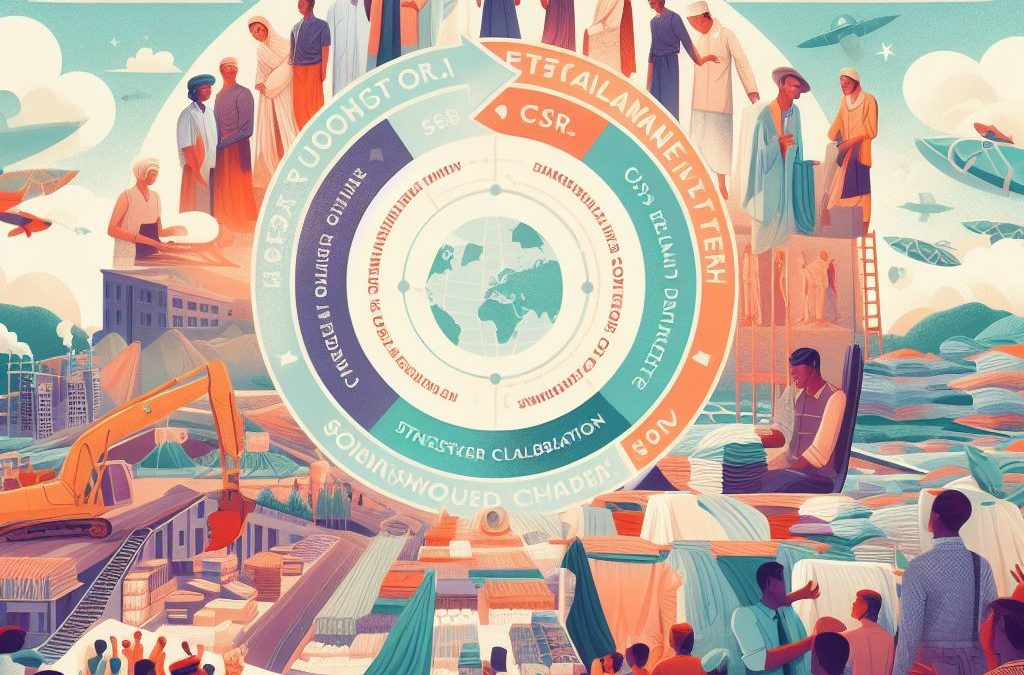Introduction
The garment industry is a cornerstone of Bangladesh’s economy, accounting for over 80% of the country’s exports and employing over 4 million workers, predominantly women. However, this industry is riddled with ethical issues and challenges related to corporate social responsibility (CSR). This article provides an overview of these issues and potential solutions, drawing from three in-depth articles on the subject.
Ethical Considerations in Garment Manufacturing in Bangladesh
The garment industry in Bangladesh faces a myriad of ethical issues, from low wages and long working hours to poor working conditions and environmental pollution. Major industrial accidents, such as the 2012 Tazreen Fashions fire and the 2013 Rana Plaza building collapse, have underscored the urgent need for improved safety standards and working conditions. Furthermore, the industry is marked by restrictions and abuse against union activities, child labor, discrimination against women, and health issues and harassment of workers.
Addressing these ethical issues requires a multifaceted approach, including improving wages and benefits, stricter enforcement of labor laws and safety standards, allowing workers to form independent unions, and investing in green technology and sustainable practices. However, implementing these solutions is not without challenges, such as resistance from factory owners, lack of resources and training, and reluctance from Western brands to sacrifice low production costs and flexibility. Overcoming these obstacles requires cooperation between the government, civil society, brands, and workers. For a more detailed discussion on these ethical considerations, potential solutions, and the challenges in implementing these solutions, click here.
Role of Non-Governmental Organizations (NGOs) in Bangladesh’s Garment Sector
In the absence of strong unions, NGOs have stepped in to provide basic services, training, and support in the garment sector. These organizations have played a significant role in supporting local unions through funding, training women leaders, and launching transnational campaigns against poor conditions. However, the relationships between unions and NGOs are often competitive, not collaborative, and NGOs have faced criticism for encouraging dependence rather than empowerment.
Transnational ties shape NGO roles, bringing funds but also agendas. Participation of local NGOs in ethical trade/CSR initiatives of brands brings resources but can lead to depoliticization and demobilization. There are several ways that worker voices could be better represented in CSR and ethical trade bodies, such as including worker-elected representatives in all factory-level committees dealing with codes of conduct implementation. For a more comprehensive understanding of the role of NGOs in Bangladesh’s garment sector, refer to this article.
Corporate Social Responsibility (CSR) Practices in Bangladesh’s Garment Factories
CSR involves companies integrating social, environmental, and ethical concerns into their business operations and core strategy. However, CSR practices in Bangladesh’s garment factories remain relatively underdeveloped compared to Western countries. Most factories engage in some basic philanthropic community activities but rarely integrate CSR fully into their strategy.
Factories that implement strong CSR practices can experience increased worker productivity, lower turnover, improved order volumes, and enhanced bargaining power with buyers. However, Bangladesh garment factories face several challenges in integrating CSR into their business strategy, including costs, short-term focus, lack of resources/expertise, and weak regulation enforcement.
Suggestions for improving CSR practices include collaboration between factories on compliance to lower costs, strengthening local industry associations to jointly monitor CSR, and more focus on integrating CSR into the business strategy of garment factories themselves. For a more in-depth analysis of CSR practices in Bangladesh’s garment factories, refer to this source article.
Conclusion
Progress has certainly been made in the Bangladesh garment industry since the Rana Plaza incident, yet the path towards fully embracing and implementing ethical standards and CSR practices that genuinely benefit workers and the community is a continuous one. Overcoming these challenges requires not only effort and dedication but also collaboration and partnership. At Brandex Sourcing, we are committed to building a more sustainable, ethical, and profitable future in garment manufacturing. Our dedication to quality control, affordability, timely delivery, and fair treatment of both the environment and our workers is unwavering.
Are you in need of a responsible manufacturing partner that aligns with your ethical considerations and corporate social responsibility? Reach out to us today for a personalized quote and discover how we can make a significant difference in your sourcing needs. The journey may be challenging, but with Brandex Sourcing, the destination is not only attainable but worth the effort. Together, we can pave the way for a more ethical garment industry in Bangladesh.

